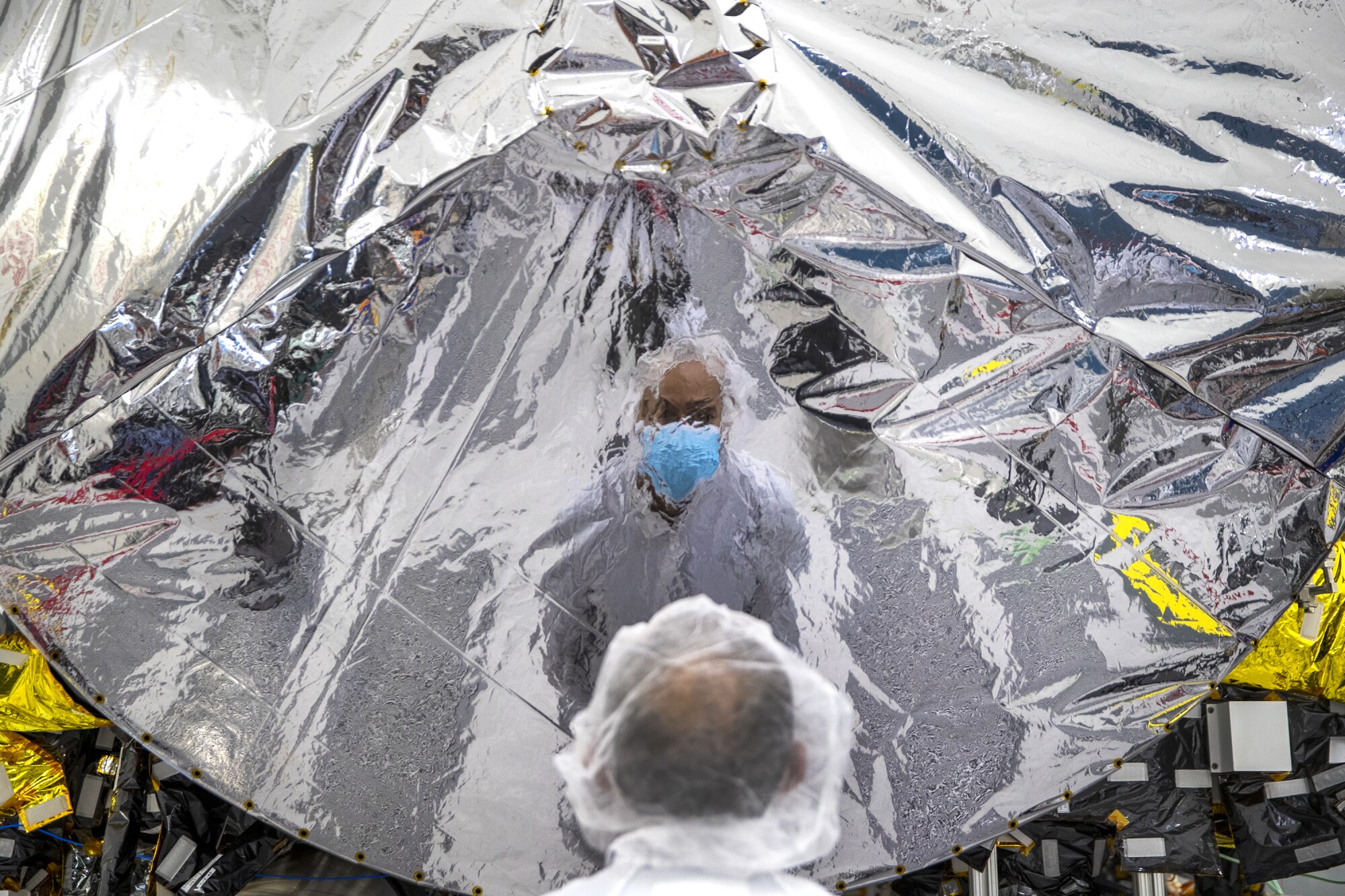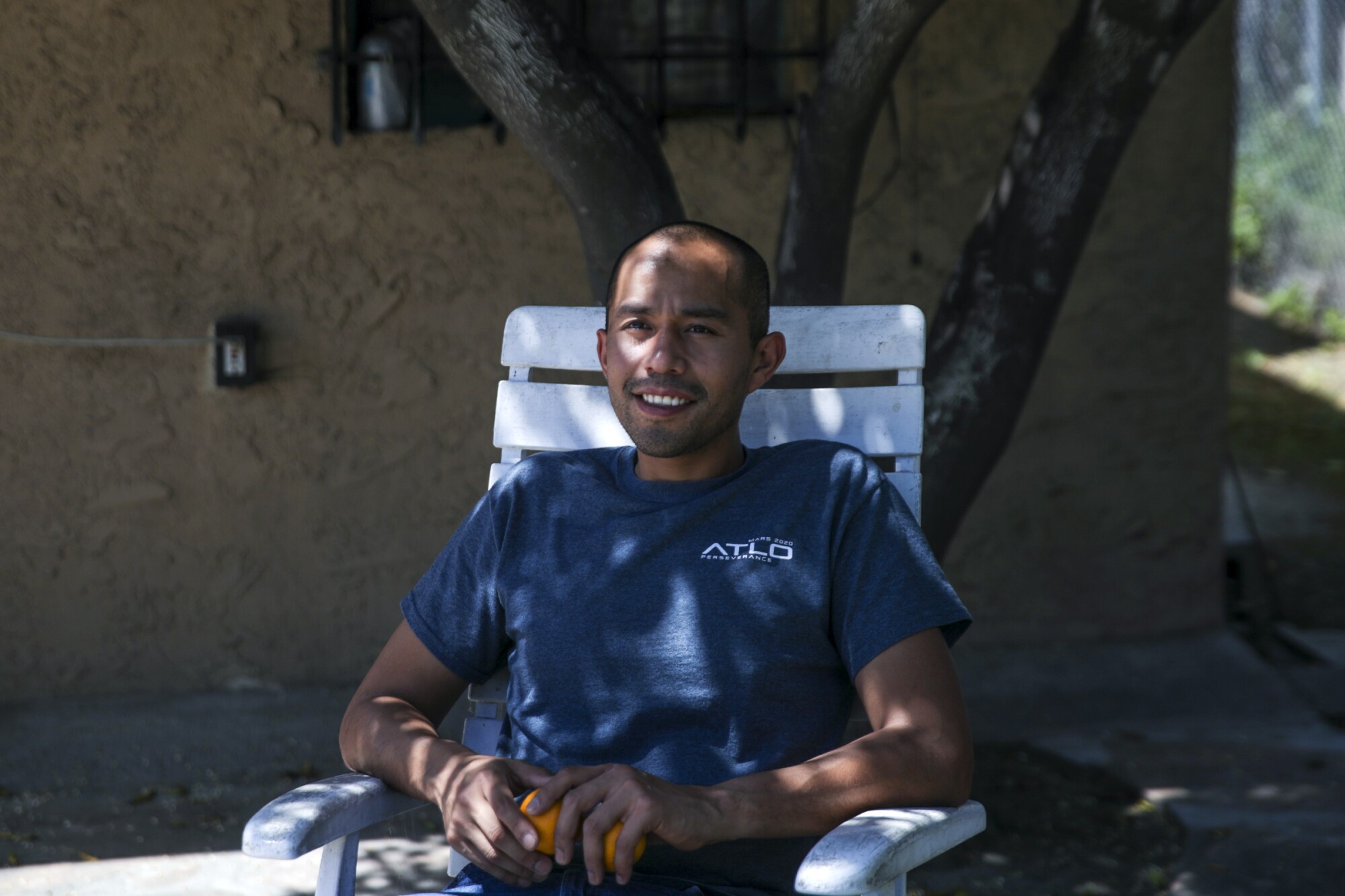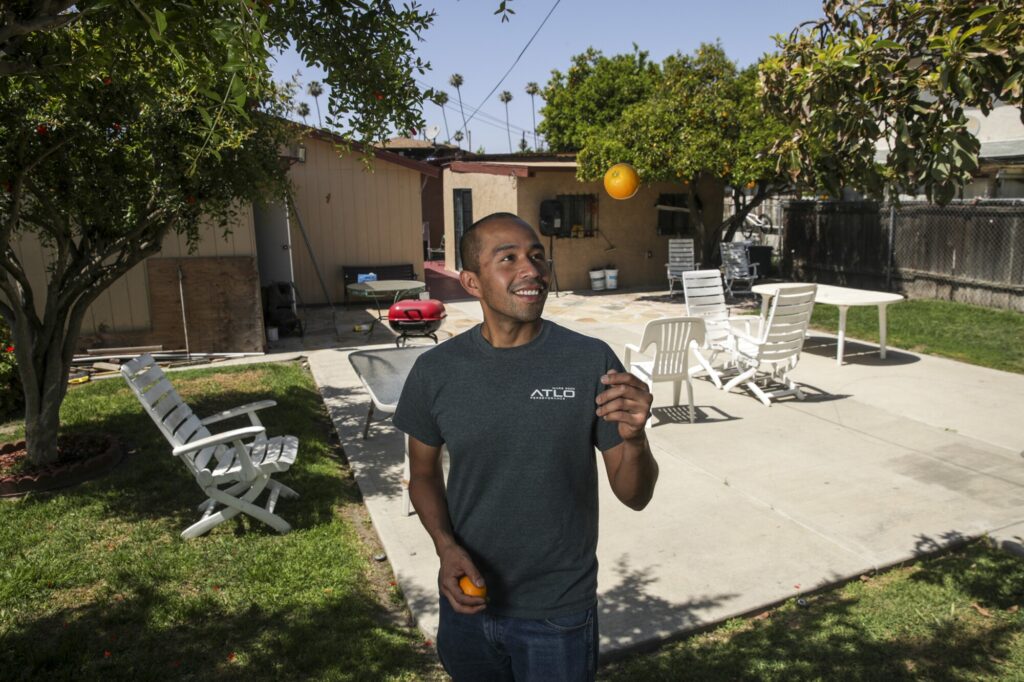You may have seen the story about the Psyche mission, in which NASA is preparing to launch a spacecraft that will travel to an asteroid in search of information that might unlock some of the mysteries of the universe.
But I’m going to tell you the story of a different journey. It’s about how Luis Dominguez, the son of immigrants from Mexico and Honduras, traveled from South Los Angeles to the Jet Propulsion Laboratory, where he helped build the Psyche spacecraft.
Dominguez, 34, is the eldest of three boys born to Luis and Cecilia Dominguez. His dad is an auto mechanic, and Luis tagged along to his dad’s shop when he could, pitching in at times. His mom was a housekeeper for a while, and as a boy, Dominguez went on jobs with her, too.
Dominguez, Systems Engineer at JPL, worked on Mars missions and is in-charge of assembling, testing, and launching the Psyche spacecraft that’s soon going to be launched to study an asteroid. Dominguez is seen at his childhood home where he used to spent time planting trees and pick fruits in Los Angeles , CA.
(Irfan Khan/Los Angeles Times)
His education began at Vermont Elementary in L.A. Unified, followed by Audubon Middle School, where, by his account, he wasn’t the best student in the building. But when a seventh-grade classmate brought a book to class about flight, he knew what he wanted to do with his life.
“I was fascinated, and I said, ‘OK, I want to work on airplanes,’ ” Dominguez said. He went on to Westchester High School, which had an aerospace magnet.
Dominguez told me he was up at 5 in the morning, and the bus ride to school took about an hour. Knowing what he wanted to do with his life made him more focused, and his GPA shot up like a missile. On a campus career day, a visiting Cal State professor advised him to consider majoring in mechanical engineering in college rather than aerospace, because it would give him more work options.
“Luis walked in the door and it was like,” ‘Hey, what can I do? Hey, let me help you with that.’
— David Gruel, JPL Engineer
And so he did — at Cal Poly Pomona. Dominguez lived at home to save money. He commuted to college daily, put in some hours at a convenience store and a sandwich shop in his spare time, also worked as a gardener and helped out at his dad’s auto shop in Inglewood.
“In my junior year we had a career fair and JPL was there, and honestly, I didn’t even know what JPL was. I was just giving my resume to everybody,” said Dominguez, who had a 3.98 GPA at the time, and was shopping for an internship. “I got a call back pretty quickly and was like, who’s JPL? I looked it up on the internet and thought, oh, that’s the NASA space center. This is pretty cool.”
In the fall of 2007, Dominguez was assigned as a part-time student intern to JPL engineer David Gruel, who led the team assembling the Mars Science Laboratory for the Curiosity mission. A lot of student interns are passive or introverted, Gruel said. Not Dominguez.

NASA systems engineer Luis Dominguez is a team leader working on the Psyche spacecraft that will study a metal rich asteroid located between Mars and Jupiter Dominguez is reflected in foil covering the spacecraft.
(Robert Gauthier/Los Angeles Times)
“Luis walked in the door and it was like, ‘Hey, what can I do? Hey, let me help you with that.’ You could tell he was excited to be where he was and wanted to contribute, and he was open and willing to doing whatever task we asked him to do,” Gruel said. “So his first JPL experience was seeing a rover being built, which was going to land on the surface of Mars.”
When the internship was done, and Dominguez graduated from Cal Poly Pomona, he had his heart set on a career at JPL. He recalls telling Gruel, “Just hire me. I’ll mop the floors. I’ll do anything.”
Gruel had seen Dominguez evolve as an intern from small tasks to doing tech support for Curiosity engineers.
“I could tell that Luis was going to be a catch and that JPL would definitely benefit from bringing him on as a full-time engineer,” Gruel said.
Dominguez went to JPL straight out of college and has been there since. He was deputy electrical integration and test lead on the Mars Perseverance rover that launched in 2020. He’s now the lead electrical engineer on the Psyche satellite, overseeing a team of five, and he’ll be in Florida when Psyche launches in August from Cape Canaveral.
Dozens of engineers and support staff are on the Psyche team. Essentially, Dominguez and his crew build the electronic guts of the craft. They take components manufactured at JPL and around the world, string everything together and put it to the test.
“In a nutshell, we build the spacecraft, we take it into an environment where we shake it, we bake it, and then blow a bunch of highly pressurized air at it to create the acoustic environment you get during launch,” said Dominguez.

Dominguez, at his childhood home where he used to spent time planting trees and pick fruits in Los Angeles , CA.
(Irfan Khan/Los Angeles Times)
The craft will travel through space for years, scheduled to arrive at its destination — an asteroid known as 16 Psyche — in 2026. Asteroid mining is considered a future possibility, Dominguez said, but he’s more curious about the primary aspect of the mission.
“The cool thing about it is that it’s the biggest metallic asteroid we know about, and all data point to the fact that it is likely the core of a failed planet,” said Dominguez. “We can get a better understanding of what the core of Earth might look like, which is something we’ve never been able to do.”
At JPL on Monday, Dominguez and others were putting the finishing touches on the spacecraft. At media day, I bumped into Brian Bone, manager of the assembly, test and launch operations unit.
“Luis has been a key player,” Bone said. “I’ve seen few people put in as much work whether you ask them to or not. He’s just all in, and he’s always excited to be here.”
Dominguez — who is engaged to a woman he met years ago when they both worked at a McDonald’s — will soon move with the JPL team to Florida for the summer. He gave up the lease on his downtown L.A. apartment and moved temporarily into the brown stucco home where he spent much of his youth, in the neighborhood southwest of USC.
When I visited him there, his parents were away, visiting family in Mexico and Honduras, but I got to speak to them by phone.
He was always a smart kid, and he worked hard, said his mother, Cecilia.
“I never had a doubt that he was going to make it,” said his father, who’s proud of all three sons. One of Luis’ younger brothers is a physician assistant, and the other is a legal assistant intent on becoming a lawyer.
Dominguez told me that during his time at JPL, he’s developed another passion.
“One of the things that most excites me is the opportunity to do community outreach and talk to kids about the stuff I do — especially kids who come from where I came from,” he said.
Last fall, Dominguez was the featured motivational speaker in an address broadcast to students, faculty and staff in the Cal State system. The Cal Poly alum told his story from the chancellor’s office in Long Beach, noting the focus it took for him to become a better student in high school. He credited his parents with showing him the value of sacrifice and hard work.
“I never thought I’d help put two 1-ton robots and a helicopter on Mars,” he told his audience, calling himself a “first-generation college student and a proud child of immigrants.”
His advice to every student was to shoot high, take risks, be unafraid to fail, and to live life with “courage, curiosity, tenacity and a healthy dose of altruism, because those are the tenets that got me where I am today.”
Dominguez — named in 2017 by CNET en Español as one of the 20 most influential Latinos in technology — closed with this:
“Just like the universe, every human being is filled with infinite capabilities and infinite possibilities, with genius, no matter their background, no matter their ZIP Code, no matter their financial circumstance. It is incumbent upon us as leaders to find that genius, to stoke it and let it shine, because at the end of the day, genius is everywhere.”
steve.lopez@latimes.com

